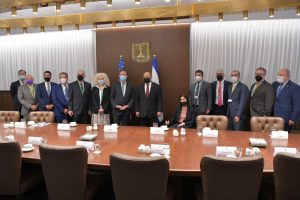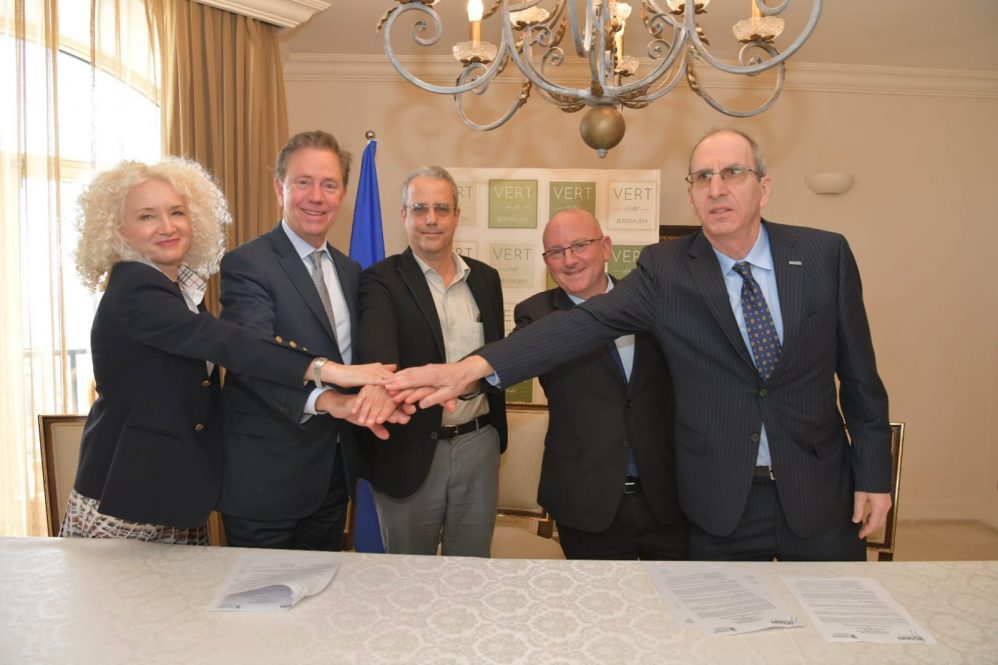UConn’s faculty research expertise, commitment to sustainability, and reputation as a hub for innovation and job creation were all highlighted this month as Interim President Radenka Maric joined Gov. Ned Lamont and others for a historic economic development mission to Israel.
The trip, which concluded last week, also resulted in the signing of a Memorandum of Understanding (MOU) to continue and build upon UConn’s partnership with the Technion-Israel Institute of Technology.
That partnership started in 2012 and focuses on clean energy research and the exchange of faculty and students between the institutions for collaborations on that topic and other projects to promote sustainability.
The MOU creates a framework for UConn and the Technion to translate their research into clean energy companies and strategies to transition away from fossil fuel dependence to carbon-neutral economic development. In Connecticut, the research has the potential to help the state become a regional green hydrogen hub.
Maric and Daniel Weiner, UConn’s vice president for global affairs, represented the University during the five-day economic development mission to Israel. They provided critical perspectives throughout the visit on ways in which UConn’s role as a major research institution enhances Connecticut’s attractiveness for new companies and investments.

“One of the highlights for me was that one of the faculty members from Technion said, ‘Governor Lamont, we choose UConn because you have one of the best universities in the world’,” Maric said Monday as she joined Lamont and others at Connecticut Innovations headquarters in New Haven for an overview of the mission.
“He said that they come to UConn because of its vision and investment in its infrastructure, equipment, and faculty,” she added. “To advance technology and to address societal challenges such as clean energy, we cannot do that without a research university – and UConn is that research university.”
Maric, Weiner, Lamont, and others spent five days following a packed schedule of key meetings and other gatherings with Israeli business incubators and entrepreneurs, venture capitalists, leaders in higher education and government, and others focused on innovation and employment growth.
In addition to the Governor and UConn representatives, the delegation included companies in aerospace and healthcare; fintech company Digital Currency Group; the Jewish Federation Association of Connecticut; Connecticut Innovations; and the state Department of Economic and Community Development.
David Lehman, Connecticut’s commissioner of the Department of Economic and Community Development, said they focused on industry areas in which Connecticut and Israel have common interests and where potential is ripe for collaboration such as fintech, biotech and life sciences, food and agriculture technology, and aerospace and defense.
Not by coincidence, UConn’s curriculum and research also aligns strongly with the same areas, in which it has strength both in helping startup companies develop and launch; and in providing students with strong foundations to build careers and innovate in those fields after graduation.
During the trip’s third day, Maric was an invited participant in a discussion on female-led innovation and workforce development led by Ruth Porat, chief financial officer of Google and its multinational holding company, Alphabet Inc. Maric and representatives from Technion also led a session around their clean energy initiative.
Maric said that meeting people and spending time exploring ideas together was extremely valuable, and that the trip’s benefits will be long-lasting.
“It was truly a win-win: a lot of learning, a lot of building relationships, a lot of thinking about what’s next in fintech, in bioengineering, in digital health, in personalized medicine, and in clean energy,” she said. “I see this as an important relationship for us to help advance our state to the next level.”
In addition to their small size but strength in innovation – both “punching above our weight,” Lamont joked – Connecticut and Israel also share economic and cultural concerns, including determining how to ensure that opportunities are available across the board to traditionally underserved or disadvantaged groups.
The themes of diversity, equity, and inclusion emerged many times in meetings throughout the visit in the gatherings, including with the Google executives and with Prime Minister Naftali Bennett and Foreign Minister Yair Lapid.
In each of the gatherings, the participants reiterated that Israel views their innovation, entrepreneurship, and small company formation as one important element of the process to promote peaceful coexistence between Arabs and Jews.
During the visit, Maric and Weiner also were able to share details of the UConn Abrahamic Initiative – established before the Abraham Accords – which is successfully promoting regional academic cooperation along with peace building.
The latest UConn Abrahamic program is specifically focused on how universities contribute to local and regional innovation and entrepreneurship, and best practices for empowering historically marginalized populations in the process.

Maric and Weiner also were able to learn more about Israeli innovation in food and agricultural technology, or ag tech, including ways in which food can be produced with sustainable land and water use.
Officials said Monday that two of the companies they pitched to come to Connecticut work in that field, and including one that makes meat from stem cells and therefore produces no methane.
The interest from the Israeli companies is potentially excellent news for UConn, where the College of Agriculture, Health and Natural Resources (CAHNR) is exploring the potential to launch a food tech innovation lab, and where faculty members have already made discoveries in growing meat from stem cells.
“This cultured meat and chicken (industry) is fascinating,” Lamont said Monday. “These production facilities are not manufacturing – this is lab space.
“Necessity is the mother of invention. Israel doesn’t have a lot of land, they don’t have a lot of water, and they like meat and chicken,” he added. “So here’s an opportunity to develop 10 lbs. of prime beef without water, without acres of land, without any of that environmental devastation. They’ve got preliminary approvals about it, and they’re very interested in Connecticut.”



